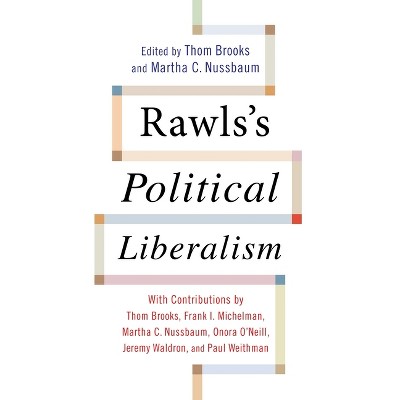Sponsored

Beyond Liberalism - (Columbia Themes in Philosophy) by Prabhat Patnaik
$140.00
In Stock
Eligible for registries and wish lists
Sponsored
About this item
Highlights
- Liberalism holds that individual freedom can be realized under capitalism.
- About the Author: Prabhat Patnaik has taught economics at the University of Cambridge and Jawaharlal Nehru University, where he is currently professor emeritus.
- 312 Pages
- Philosophy, Political
- Series Name: Columbia Themes in Philosophy
Description
About the Book
This book is a Marxist critique of liberalism. Prabhat Patnaik brings together political philosophy and political economy to offer a renewed vision of socialism.Book Synopsis
Liberalism holds that individual freedom can be realized under capitalism. "Classical liberalism" tends to focus on excessive state interference as the primary threat to freedom. More recent theorists, however, recognize that capitalism, left to itself, would be characterized by mass social ills and argue that state intervention is necessary to guarantee individual freedom.
This book is a Marxist critique of liberalism. Prabhat Patnaik demonstrates that liberalism and Marxism provide vastly differing accounts of individual freedom and the forces that restrict it. In the Marxist view, people, contrary to appearances, lack real agency under capitalism. Competition coerces individuals to act according to the impersonal logic of capitalism, making them mere instruments of the system. In this way, capitalism creates universal alienation, and true individual freedom is possible only through overcoming it. Patnaik argues that socialism can secure individual agency in both economic and political spheres, though actually existing socialism has failed in this respect. He also considers what a socialist society should look like: not a planned economy but a highly decentralized system in which citizens are directly involved in taking decisions affecting their lives and enjoy fundamental economic rights as well as political ones. Readable yet rigorous, Beyond Liberalism brings together political philosophy and political economy to offer a renewed vision of socialism.Review Quotes
[Beyond Liberalism] provides an excellent starting point for discussing the shape of an alternative society that would be a normative advance in world history. For this reason and many, many others, Patnaik's book warrants the strongest recommendation.-- "Cambridge Review of International Affairs"
Beyond Liberalism by Prabhat Patnaik is essential reading for anyone who wants to understand the underlying assumptions that seem to guide our world, be it in the realms of policy, economy or politics.-- "The Wire, India"
Patnaik's proposal provides a refreshing approach to post-Soviet Marxism, which often does not engage in the practical problems that face Marxist revolutions. Beyond Liberalism is a hopeful discourse in the 21st century. Patnaik provides a thought-provoking and necessary change in Marxist discourse.-- "Choice"
This book offers a deep analysis of the idea of individual freedom under capitalism. Patnaik first pursues this question through examining the works of major authors, including Locke, Smith, Keynes, and Marx. Within this framework, he then considers issues around colonialism, imperialism, socialism, and social democracy with insight and force.--Robert Pollin, coauthor of Climate Crisis and the Global Green New Deal
Prabhat Patnaik's book, integrating perspectives from economics, philosophy, and politics, is a brilliant critique of the complicity of liberal doctrine with capitalism through its entire history: from its earliest formations in the seventeenth century through the extended period of European colonialism, the Keynesian caesura after the Second World War, down to the neoliberal period of globalized finance of our own time.--Akeel Bilgrami, author of Capital, Culture, and the Commons
Prabhat Patnaik skillfully combines empirical evidence and philosophical reasoning to make an engaging and insightful interdisciplinary critique of liberal doctrine, questioning its account of capitalism at its avowedly strongest point: its claim to embody and promote individual freedom.--David Leopold, author of The Young Karl Marx: German Philosophy, Modern Politics, and Human Flourishing
About the Author
Prabhat Patnaik has taught economics at the University of Cambridge and Jawaharlal Nehru University, where he is currently professor emeritus. His books include Accumulation and Stability Under Capitalism (1997), The Value of Money (2009), A Theory of Imperialism, with Utsa Patnaik (2017), and Capital and Imperialism, with Utsa Patnaik (2021).Dimensions (Overall): 8.5 Inches (H) x 5.5 Inches (W) x .81 Inches (D)
Weight: 1.2 Pounds
Suggested Age: 22 Years and Up
Series Title: Columbia Themes in Philosophy
Sub-Genre: Political
Genre: Philosophy
Number of Pages: 312
Publisher: Columbia University Press
Format: Hardcover
Author: Prabhat Patnaik
Language: English
Street Date: September 10, 2024
TCIN: 91368117
UPC: 9780231216319
Item Number (DPCI): 247-17-8208
Origin: Made in the USA or Imported
If the item details aren’t accurate or complete, we want to know about it.
Shipping details
Estimated ship dimensions: 0.81 inches length x 5.5 inches width x 8.5 inches height
Estimated ship weight: 1.2 pounds
We regret that this item cannot be shipped to PO Boxes.
This item cannot be shipped to the following locations: American Samoa (see also separate entry under AS), Guam (see also separate entry under GU), Northern Mariana Islands, Puerto Rico (see also separate entry under PR), United States Minor Outlying Islands, Virgin Islands, U.S., APO/FPO
Return details
This item can be returned to any Target store or Target.com.
This item must be returned within 90 days of the date it was purchased in store, shipped, delivered by a Shipt shopper, or made ready for pickup.
See the return policy for complete information.











